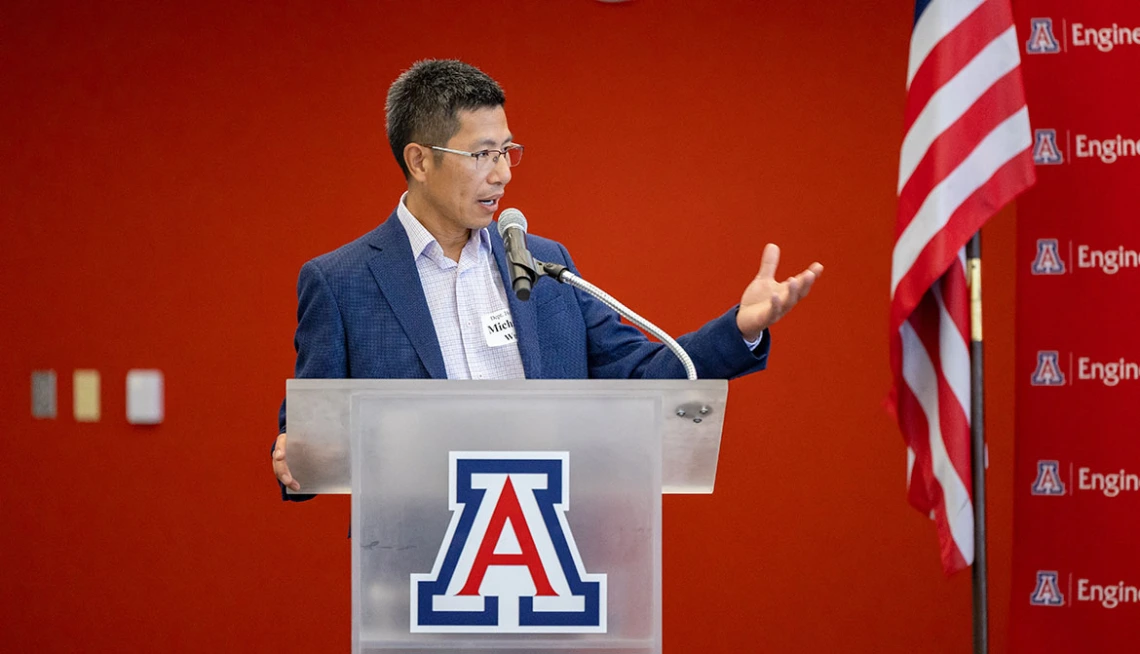Thomas R. Brown Leadership Chair boosts growth and expertise in electrical and computer engineering
Inaugural holder Michael Wu expands research in crucial areas including AI.

Michael Wu, who heads the Department of Electrical and Computer Engineering, is the inaugural Thomas R. Brown Leadership Chair.
The head of the University of Arizona College of Engineering’s electrical and computer engineering department will have a dedicated endowment in perpetuity to serve its highest needs, thanks to the Thomas R. Brown Family Private Foundation. Michael Wu is the first holder of the Thomas R. Brown Leadership Chair in ECE.
The Brown Foundations are the legacy of Thomas R. Brown and the Burr-Brown Corp., which he co-founded. U of A graduates contributed greatly to Burr-Brown’s success, said Brown family members, and the foundations support scholars and programs across campus.
“I’m grateful for the Brown family’s confidence in ECE to continue and exceed its record of excellence,” said David W. Hahn, the Craig M. Berge Dean of the college. “They have made a moving tribute to Thomas R. Brown and provided resources to invest strategically as opportunities arise in education and research. The story of the man behind Burr-Brown will undoubtedly inspire those receiving support.”
An ECE milestone
Wu, who became ECE’s head in 2022, called the chair not only an honor for himself but a milestone for a department that is growing quickly and leading crucial efforts in artificial intelligence and cybersecurity, among other fields.
“This endowment comes at a perfect time to support new initiatives,” said Wu, who joined the U of A from Old Dominion University, where he was the Batten Chair of Cybersecurity and director of the School of Cybersecurity.
ECE welcomed five faculty members at the start of the 2024-2025 academic year. The department launched a BS program in computer science and engineering in 2023 and has since added graduate degree options. Wu and other faculty members have secured millions of dollars in research grants for online security and privacy, Next G communication, and emerging semiconductor technologies.
In fact, the funds will benefit machine learning education and research across campus, said Wu. For example, the department recently opened a lab focused on modern machine learning, a branch of AI that enables computer systems to learn from data and make decisions autonomously.
“We can upgrade lab equipment, hire student assistants, and offer the facility to researchers from Engineering and outside the college,” said Wu. “AI is a powerful tool for analyzing data, making predictions and navigating complicated situations. There’s strong potential for interdisciplinary work across fields, including humanities and arts.”
The endowment will also fund jobs for undergraduate and graduate student assistants working on faculty projects, including Wu’s research in privacy and safety. He has published dozens of papers on securing sensitive data and defending against cyberattacks to AI models.
Additionally, Wu is planning a Thomas R. Brown Faculty Fellows program with three, three-year rotating faculty fellowships awarded to ECE researchers demonstrating excellence in strategic research areas.
“This is support for research and education spanning a wide spectrum of disciplines,” said Wu.
To further support the College of Engineering, the foundation recently established a separate endowment for doctoral student support. Endowments established more than 20 years ago in the college fund undergraduate scholarships and a chair in biomedical engineering, held by Jennifer Barton.
Decades of success and connection
Brown, who died in 2002 at the age of 75, founded Burr-Brown Research Corp. with Page Burr in 1956. The Tucson company grew from a garage startup advancing transistor technology to the world’s largest supplier of high-performance analog semiconductors. Burr left the company after a few years, and Brown led the company until his retirement in 1998. Texas Instruments bought Burr-Brown in 2000.
ECE dedicated a conference room to Brown in 2012. The room displays several graphic panels tracking the Burr-Brown history by decade and illustrating company successes and key ties to the university.
In addition to College of Engineering support, the Brown Foundations have established endowed chairs, fellowships and scholarships in the College of Science, the Eller College of Management and the Wyant College of Optical Sciences.
“The Browns have always understood how supporting both students and faculty builds a strong university ecosystem,” said JP Roczniak, president and CEO of the University of Arizona Foundation and vice president of development and chief development officer for the U of A. “This chair will accelerate strategic 21st-century learning and research in AI and cybersecurity. We are deeply grateful.”


